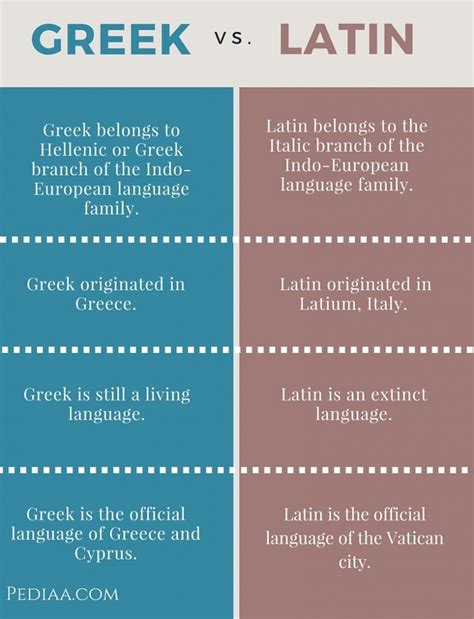Historical Origins and Development
Latin and Greek, two classical languages that have shaped Western civilization, trace their roots back to different Indo-European linguistic families. Latin emerged from the Italic branch, while Greek originated from the Hellenic branch.

- Latin: Developed in ancient Rome around the 6th century BCE.
- Greek: First attested in written form during the Mycenean period (1450-1200 BCE).
Geographical Distribution and Literary Legacy
Latin and Greek enjoyed immense geographic spread and played a pivotal role in shaping the cultural and intellectual landscapes of their respective regions.
- Latin: Spoken throughout the vast Roman Empire, extending from Britain to North Africa. Became the lingua franca of Western Europe for centuries after the fall of the Roman Empire.
- Greek: Used as the language of literature, philosophy, and science in ancient Greece. Remained influential in the Byzantine Empire and Eastern Orthodox Church.
Language Features and Similarities
Phonetics and Phonology
-
Latin:
- Consonantal system with voiced and unvoiced stops, fricatives, nasals, and liquids.
- Vowel system with five short and five long vowels.
-
Greek:
- Similar consonantal system to Latin, but with an additional aspirated series.
- Vowel system with seven short and seven long vowels.
Morphology and Syntax
-
Latin:
- Rich system of noun declensions and verb conjugations.
- Extensive use of synthetic constructions, where grammatical information is conveyed through suffixes and prefixes.
-
Greek:
- Complex system of declensions and conjugations, with irregular forms.
- Extensive use of particles and prepositions to express grammatical relationships.
Literary Contributions and Cultural Impact
Latin and Greek have left an enduring legacy in the world of literature, philosophy, and science.
-
Latin:
- Produced works by renowned authors such as Cicero, Virgil, and Ovid.
- Served as the language of the Roman Catholic Church and Western education.
- Influenced the development of Romance languages (e.g., Spanish, French, Italian).
-
Greek:
- Cradle of Western philosophy (Socrates, Plato, Aristotle).
- Home to great literary epics (Iliad, Odyssey) and dramatic masterpieces (Aeschylus, Sophocles, Euripides).
- Utilized in the Eastern Orthodox Church and Byzantine Empire.
Table 1: Comparative Phonology
| Feature | Latin | Greek |
|---|---|---|
| Consonant System | 25 consonants | 26 consonants |
| Vowel System | 10 vowels | 14 vowels |
| Aspiration | No aspirated consonants | Aspirated consonants |
Table 2: Comparative Morphology
| Feature | Latin | Greek |
|---|---|---|
| Noun Declensions | 5 declensions | 3 declensions |
| Verb Conjugations | 4 conjugations | 4 conjugations |
| Synthetic Structures | Extensive use of suffixes and prefixes | Extensive use of particles and prepositions |
Table 3: Comparative Literary Legacy
| Feature | Latin | Greek |
|---|---|---|
| Authors | Cicero, Virgil, Ovid | Homer, Plato, Aristotle |
| Literary Genres | Poetry, history, oratory | Epic poetry, drama, philosophy |
| Influence | Romance languages, Catholic Church | Eastern Orthodox Church, Western philosophy |
Table 4: Comparative Geographical Distribution
| Feature | Latin | Greek |
|---|---|---|
| Region | Western Europe, North Africa | Ancient Greece, Byzantine Empire |
| Spread | Roman Empire | Hellenistic world |
Modern Usage and Applications
Despite their classical origins, Latin and Greek continue to be used and studied in various contexts today:
- Educational: Latin and Greek are taught in schools and universities as part of classical studies programs.
- Etymology: Many English words are derived from Latin and Greek roots, helping to understand the origins and meanings of words.
- Medical and Scientific Terminology: Many medical and scientific terms are based on Latin or Greek words.
- Legal and Diplomatic Language: Latin and Greek have traditionally been used in legal documents and diplomatic correspondence.
- Archaeological and Historical Research: Classical languages provide valuable insights into ancient civilizations and their languages.
Conclusion
Latin and Greek are two influential classical languages that have played a significant role in shaping Western civilization. Their rich literary legacy, complex language structures, and enduring impact continue to be appreciated and studied today. By understanding the similarities and differences between these two ancient tongues, one gains a deeper appreciation for the complexities and diversity of human languages.
